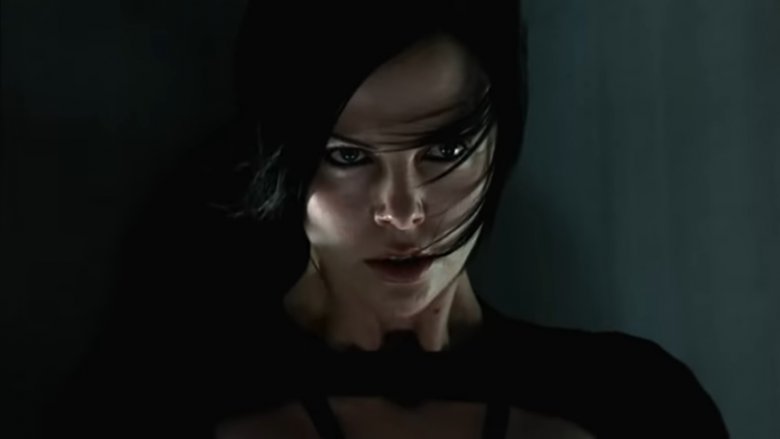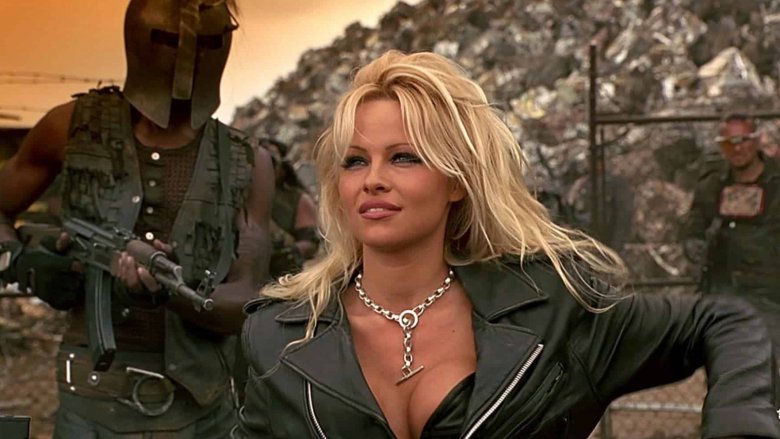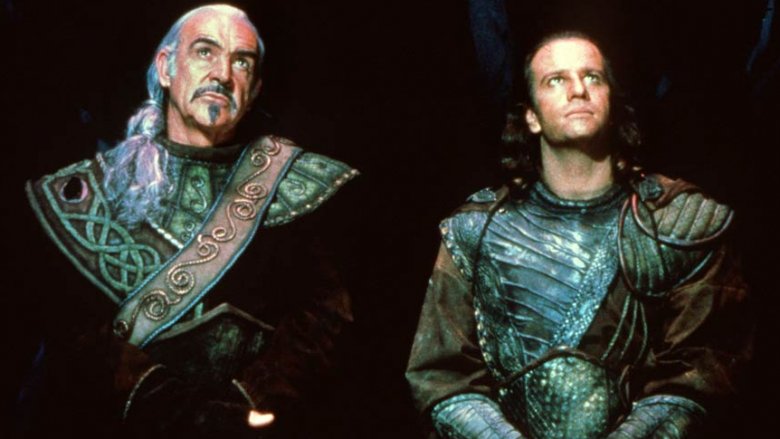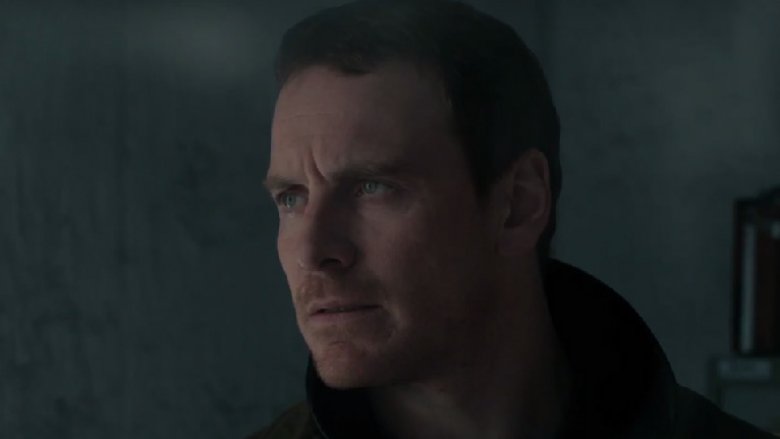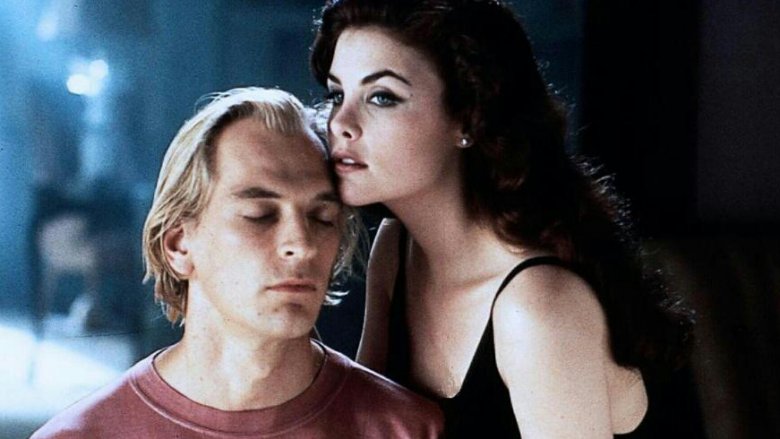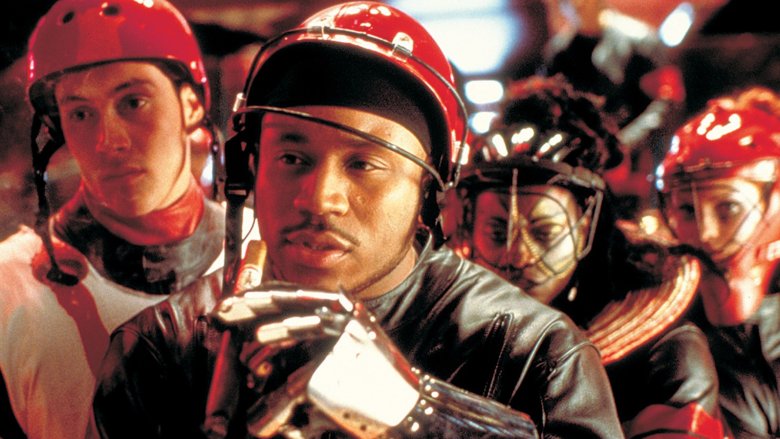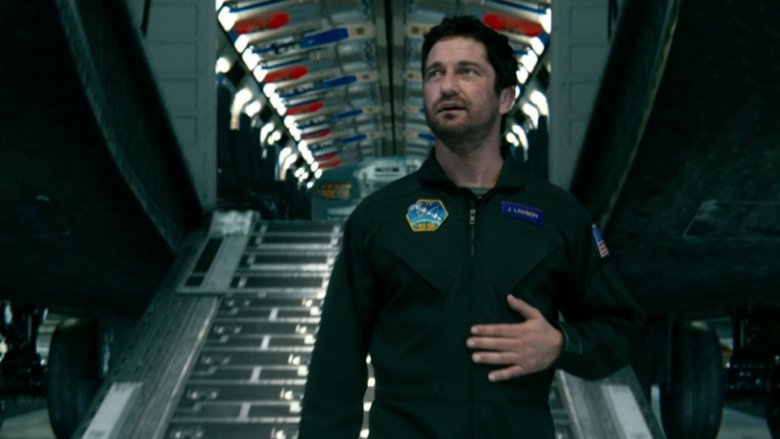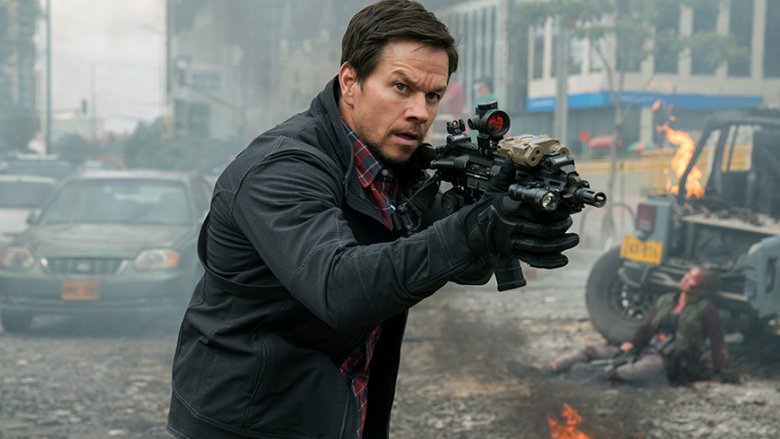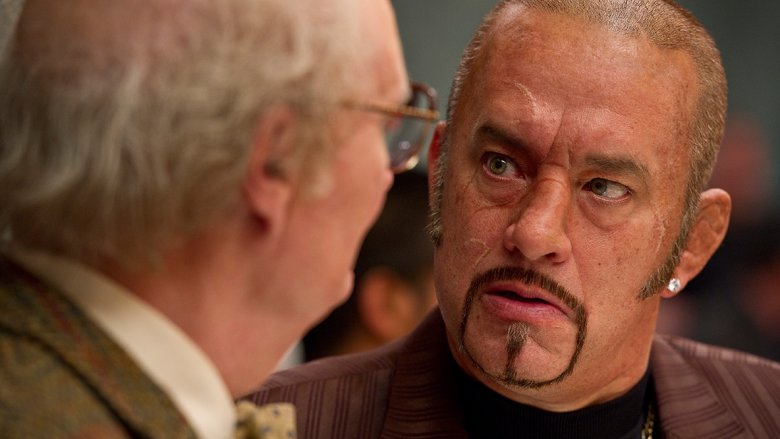Movies That Flopped Because The Plot Didn't Make Any Sense
For every Hollywood picture that scores megabucks at the box office, there's at least one more that does the exact opposite. Film production and promotion is an inexact science, and in an industry which typically grosses north of $10 billion per year, there's a lot of money getting thrown at a lot of questionable projects. Movies that flop super hard do so for a lot of different reasons — perhaps the film's premise can't be tidily summed up by a standard marketing campaign (John Carter, Mortal Engines), or the filmmakers rely too heavily on a grab bag of cliches (The Darkest Minds), or the competition is just too stiff (anything that opens against an Avengers movie).
But then, there are those movies that simply confound audiences with their resolute refusal to tell anything resembling an intelligible story. Whether they have terminal problems at the screenplay stage, get thoroughly jumbled in editing, or even wind up missing huge chunks of what was supposed to be onscreen, the results are the same: confusion, annoyance, and anemic box office. These are some of those films — the giant flops that earned that status by virtue of simply making no damn sense.
Jupiter Ascending
The Wachowskis, sisters Lana and Lilly, are undeniably talented filmmakers. Give them a $60 million dollar budget and a hunger to prove themselves, and they'll give you The Matrix. But give them the title of "visionary auteurs" and more money than God, and they'll give you Jupiter Ascending, a film so wrapped up in its own weird mythology that it forgot to tell a story that was accessible, compelling, or coherent. Focusing on a character with the unlikely name of Jupiter Jones (Mila Kunis) whose destiny is to become a space princess with the assistance of an alien soldier (Channing Tatum), the film is nothing if not great-looking — the Wachowskis have always excelled at that. Unfortunately, the story's byzantine plotting only served to confuse audiences, Kunis' character (who spends most of the film completely flustered by the goings-on around her), and Kunis herself.
Appearing on The Late Late Show with James Corden, the actress was asked to explain Jupiter Ascending's plot. Her reply: "You know, it's about the human desire to..." That's all she could manage. Audiences could do no better — while the film grossed nearly $184 million worldwide (only $47 million domestic), its $175 million budget and expensive promotional campaign made it a staggering loss of nearly $100 million for studio Village Roadshow and distributor Warner Brothers. It may not shock you to know that this won't be the Wachowskis' only appearance on this list.
Aeon Flux
Karyn Kusama is a talented director with a seeming knack for picking either very good projects or very, very bad ones. Her debut picture, 2000's boxing drama Girlfight, wowed critics with a confident approach to character development mixed with visceral, hard hitting fight scenes. More recently, her 2018 cop mystery Destroyer (featuring a near-unrecognizable Nicole Kidman as an L.A. police detective with a troubled past) has also earned accolades. But she also gave us the 2009 horror misfire Jennifer's Body, and before that, she presided over the trainwreck that was the 2005 adaptation of the iconic MTV animated series Aeon Flux.
Critics mercilessly bashed the film for its herky-jerky pacing and confusing story, but to be fair, this wasn't all Kusama's fault. Universal Studios essentially eviscerated her cut of the movie in an effort to make it more friendly to mainstream eyes, eliminating important story beats and destroying the film's pacing in the process. Theron, meanwhile, failed to fill in any of the blanks with her flat, non-emotive performance. To the actress' credit, she totally owned up to this in an interview with Variety. "I was never completely sold on the entire concept, but I really loved [Girlfight]," she said, "so I threw myself into that with the belief that she's a great filmmaker. And then we f****d it all up. I just don't think we really knew how to execute it. And it's disappointing, but it happens." The film failed to even recoup its $62 million budget.
Barb Wire
There are plenty of successful films with no discernible plot which feature scantily clad, buxom women skipping from one nonsensical setpiece to the next, but these films are usually of the adult variety and are more likely to appear on cable late at night than in your local multiplex. Not so Barb Wire, a 1996 starring vehicle for Pamela Anderson which asked audiences to buy the starlet as a hard-boiled bounty hunter with a severe allergy to non-sexy outfits. Based on the Dark Horse comic series of the same name, the flick is set in the dystopian future of 2017, and the plot (such as it is) concerns the fevered search by Anderson's character and other interested parties for a special pair of... contraband contact lenses? Not that it really matters, for the entire film exists simply as an excuse for Anderson to fire guns while striking impossible poses in high heels and corsets.
Now, it's not as if the filmmakers were trying to create a timeless classic (although the great Roger Ebert pointed out that the plot is weirdly similar to that of Casablanca), but the jumbled story and Anderson's supremely amateurish acting robbed the movie even of any camp value it might have had. It failed to clear $4 million at the box office, but it was nominated for a slew of Razzie awards, winning Anderson one for Worst New Star.
Highlander 2: The Quickening
The 1986 cult classic Highlander was a film in which all of the weirdo elements came together to create a bizarre, gonzo sensibility which was greater than the sum of its parts. The story of an immortal Scottish warrior (Christopher Lambert) who must face a challenge from a deadly enemy bent on enslaving the human race, the film featured a number of confusing plot elements (and casting elements, like Scottish actor Sean Connery as a French warrior with a Spanish name), but it got by on its high energy and winking sense of humor. For its 1991 sequel Highlander II: The Quickening, however, the filmmakers simply said the heck with energy and humor, and ramped up the confusion.
Roger Ebert's amazing half-star review valiantly attempted to make sense of all the weird time jumps and inconsistent plot contrivances but it was an exercise in futility. "They cannot die. In a sense," he wrote. "Actually, they can, but it depends." The venerable critic pegged it as "the most hilariously incomprehensible movie [he'd] seen in many a long day," a complete mess which leaps around in time and/or space whenever its narrative threatens to start making sense. The flick only managed about $15 million at the box office, suggesting that the original film should have stood by the assertion made in its famous tagline: "There can be only one."
The Snowman
2017's The Snowman, based on a Norwegian novel of the same name, was in trouble way before it ever hit theaters. For one thing, its marketing campaign — which featured faux-chilling messages from a mysterious killer directed at "MISTER POLICE" — was so unintentionally funny that it spawned an internet meme. For another, the name of its detective protagonist ("Harry Hole") registered as quite a bit more jaw-droppingly silly with American audiences than with Norwegian ones. For yet another, describing its production as "troubled" wouldn't even scratch the surface. Director Tomas Alfredson revealed in an interview that the flick received a greenlight unexpectedly quickly, forcing him and his crew to rush into the shoot with a slapdash production schedule and an incomplete screenplay.
These things will happen, but the scramble to shore up the script and get key scenes on film produced an unthinkable result. "Our shoot time in Norway was way too short. We didn't get the whole story with us and when we started cutting we discovered that a lot was missing," the director said, elaborating that roughly 15% of the script never actually made it to celluloid. "It's like when you're making a big jigsaw puzzle and a few pieces are missing so you don't see the whole picture." Unsurprisingly, critics found the picture's plot to be borderline-nonsensical, and audiences put off by scathing reviews and that ridiculous marketing stayed away in droves.
Boxing Helena
If there's one filmmaker who has demonstrated an ability to eschew conventional plot structure in favor of abstract, surreal insanity, it's David Lynch. Even his most celebrated films (such as Eraserhead and Mullholland Drive) function more as dreamlike artworks than actual stories, but his utter confidence in his voice and vision compels audiences to come along for the ride. His daughter Jennifer, however, proved with her debut feature Boxing Helena that this quality decidedly does not run in the family.
The story of a surgeon who expresses his obsessive love for a woman by holding her prisoner in his home and amputating her arms and legs, the picture saw its first sign of trouble when would-be star Kim Basinger breached her contract to withdraw from the film, eventually ponying up a multi-million dollar settlement just to avoid starring in it. Then, the picture dropped to reviews which branded it a "grotesquely misconceived" piece of "schoolgirl surrealism," an "intellectually half-baked," unintentionally campy would-be psychodrama which was "unsuccessful in all of the various tones [Lynch] attempts." Its meandering, borderline-formless plot proved a challenge to the endurance of its audiences, and those who stuck around to the end were treated to the oldest twist in the book. Boxing Helena didn't even crack $2 million at the box office, and even though Lynch eventually proved to have much better films in her, its reception hobbled her career for years.
Rollerball (2002)
'70s sci-fi movies were heavily preoccupied with violent, dystopian future societies and technology run amok (think Logan's Run, or the original feature film Westworld), and 1975's Rollerball was no different. The story centered on the titular futuristic sport, a sort of combination of roller derby and hockey which devolves into gladatorial violence under the influence of sinister global corporations. The 2002 remake could have used the real-world corporate consolidation of the intervening years to add layers of political nuance to the story, but they did not. Instead, screenwriters Larry Ferguson and John Pogue delivered a "spectacle film" that's endlessly confusing to look at, a "political thriller" that lacks any semblance of a clear message, and — most egregious of all — a flick from Die Hard director John McTiernan featuring the most muddled action sequences in recent memory.
It's a film that can't be bothered with clarity, even in regards to the rules of its fictional sport. It's full of plot threads that go nowhere, bizarre aesthetic choices (such as one scene apparently shot in night vision), and terrible, confusing dialogue delivered poorly. The film grossed about $19 million on its budget of $70 million, leaving Roger Ebert to once again survey the damage: "Rollerball" "is an incoherent mess, a jumble of footage in search of plot, meaning, rhythm and sense. There are bright colors and quick movement on the screen, which we can watch as a visual pattern that, in entertainment value, falls somewhere between a kaleidoscope and a lava lamp."
Geostorm
Once upon a time, producer Dean Devlin — along with producer/director Roland Emmerich — brought home the box office bucks by threatening the Earth with destruction. After making their name with 1994's Stargate, the pair followed up with the cultural phenomenon that was Independence Day, which elevated the disaster film by injecting a seemingly unstoppable force of world-destroying aliens. The pair then collaborated on the much-maligned 1998 reboot Godzilla, before Emmerich went solo with 2004's The Day After Tomorrow and 2009's 2012. In 2017, Devlin returned with his own solo project — Geostorm, his directorial debut, in which an evil villain threatens the world with environmental catastrophe by way of... weather satellites.
As ridiculous as that sounds, the film that Devlin (who also wrote the script) conjured up from this premise was not so much an ill-conceived disaster yarn as it was an actual disaster. Devlin apparently decided that a headache-inducing narrative was just what was needed to flesh out his story; said one review, "The plot, which stems from the seemingly simple idea of weather-controlling satellites going haywire, quickly becomes mired in confusing government allegiances, unclear character motivations and an evil plan so nonsensical that it renders almost every single action taken by a character in the film to be meaningless." Throw in bad acting and even worse CGI, and you had a recipe for a flop of the highest order: the $120 million dollar picture grossed $33 million domestically, losing somewhere in the neighborhood of $100 million.
Mile 22
Call it the Bergverse: between 2014 and 2017, director Peter Berg and leading man Mark Wahlberg made three films together based on riveting contemporary history, all of which were quite well-received. First came 2014's Lone Survivor, an account of a daring rescue by Navy SEALs. Then, there was 2016's Deepwater Horizon, exploring the disaster that befell the deep-sea oil rig of the same name. 2017 brought us Patriot's Day, the story of the first responders to the Boston Marathon bombing. But for their next trick, the duo decided to scrap the nonfiction angle for a straightforward military thriller: Mile 22, which is ostensibly about an extraction operation performed by an elite CIA team. Unfortunately, you sort of have to take the filmmakers' word for it.
Said one absolutely brutal review, "I would like to sum up the plot of Mile 22, but unfortunately the movie's writers seemed confused themselves as to the point of their exposition. The film is so incoherent that the first half plays like a barrage of randomly violent scenes stitched together from various other cliché movies." Another observer accused the film of playing like a really long trailer for itself, featuring "the worst editing [he'd] seen in a long, long time," which certainly helps to explain its incoherence. Audiences agreed — the film failed to get within shouting distance of its $50 million budget at the domestic box office, and (perhaps not coincidentally) Berg and Wahlberg's next effort, Wonderland, is headed straight to Netflix.
Cloud Atlas
Oh, those Wachowskis. The filmmaking sisters' reputation for confusingly-plotted sci-fi weirdness was firmly cemented with their 2012 adaptation of the novel Cloud Atlas, a film which takes place across multiple time periods featuring an ensemble cast (including Tom Hanks, Halle Berry, and Hugo Weaving) who all play different characters throughout the eras. With a synopsis describing it in part as "an epic story of humankind," moviegoers knew they were in for a sprawling, expansive narrative — but when your film requires an insanely convoluted infographic just so that viewers can begin to get their heads around your story, you may be in trouble.
Critics were sharply divided on the film, with even those who praised its ambition admitting that it would take a second viewing (or third, or fourth) to even begin to bring its story into focus. Detractors simply found it maddening, detached, and — worst of all — boring, taking the Wachowskis to task for their faithfulness to the novel's borderline-unfilmable narrative. With a budget north of $100 million — one of the most expensive independent features ever produced — the film only managed about $130 million at the worldwide box office, making it one of the biggest flops of its year. Hanks, who in an interview said that working on the film "altered [his] entire consciousness" was nevertheless obliged to admit the obvious: "I've made an awful lot of movies," said the beloved actor, "that didn't make any sense."
